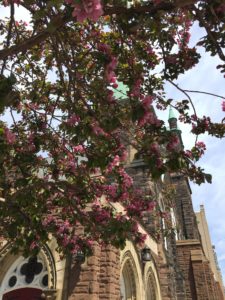Juče je bio Đurđevdan. Sunčan, mirišljav i opojan, dan pun snage i života, jedan od onih kakve može da rodi samo maj. Đurđevdan. Važan dan u istoriji jednog malog, nevažnog naroda, dan posvećen hrabrom Georgiju, onome što je, negde u trećem veku, od raznih pošasti branio hrišćansku sirotinju, delio imovinu progonjenima i ubio veliku aždaju koja je harala Palestinom proždirući sirotinjsku decu. Da li je Dioklecijanu smetala njegova hrabrost, ili je u svom mladom, obrazovanom i hrabrom oficiru, heroju i svecu običnih ljudi kojih je uvek najviše, video konkurenciju, ili su mu samo smetale samovolja i bunt jednog od njegovih poklonika, ne znamo. Ono što znamo je da je veliki car rešio da se reši Georgija uklonivši ga jednom zauvek, te je na dan 6. maja, davnog 4. veka, veliki junak i borac za hrišćanstvo ostao obezglavnljen.
Mnogo je ratova i mnogo je progona raje i siromašnih od tih davnih dana bilo, mnoga su carstva nicala, trajala i nestajala, mnogi su se, s fanfarama, doticali trona, da bi s njega, kasnije, krvavi, padali. Imperije raznih vrsta i veličina menjale su svoje ideje, svoje vođe i granice uvek negirajući i blateći jednog, a hrleći ka liku i delu nekog drugog boga. U pisanju i brisanju tih granica, između uspona i padova mnogobrojnih carstava, razne su aždaje izbijale na površinu, bljuvale vatru i tražile žrtve. Jaki i brzi pobegli bi na vreme, mudri bi se dobro sakrili, samo bi raja, zbunjena i prestravljena, ostajala na milost i nemilost čudovištu, ili bi se razbežala kojekuda, pokušavajući time da spasi samo svoj jadni, goli život. Tako razbežani, naći će se ti siromasi u nekom drugom svetu, u nekom drugom carstvu u kome će ih, tako ostavljene, same i napuštene, čekati neka druga vera, neki drugi bog. Da li će u njega poverovati, ili će biti još samlji i još izgubljeniji, zavisiće od onoga što su za sobom ostavili, od veličine aždaje pred kojom su pobegli, od količine otrova kojim ih je ona posula i od bola koji su sa sobom doneli.
<<<>>>
Koračam prema zgradi u kojoj sada žive i u kojoj sada Đurđevdan slave moji roditelji. Dobar dan poželim nekim starim Kineskinjama koje me gledaju bez reči. Dobar dan, kažem jednoj zabradjenoj Somalijki koja prođe i ne pogledavši me. Dobar dan, klimnem glavom jednom Siku duboko izboranog lica dok on, iz invalidskih kolica, priziva svoje staro, olinjalo kuče. Dobar dan, oslonjena na štap uzvraća mi stara crnkinja u crvenom kaputu i viklerima u kosi. “Dobra je ova zemlja”, u liftu mi, bez uvoda i sa nekim od slovenskih akcenata, objašnjava jedan otresiti devedesetogodišnji dedica. “Hladna je i dosadna, a u takvima se ne ratuje”.
Na sedmom spratu jedne oronule zgrade, u mnoštvu oronulih lica i još oronulijih života izbeglickog kanadskog carstva, u jednom tesnom stanu gori slavska sveća. Đurđevdan je i moji osamdesetogodišnji roditelji s nestrpljenjem čekaju da se, među strancima sa kojima žive i čije jezike ne razumeju, pojavi nas nekoliko sa kojima ce podeliti žito, kolač i ovaj lep, prolećni dan.

All this in English:
It was the day of Saint George. The sunny, colourful day, a day full of energy and life, one of those born in May only. The day of Saint George. An important day in a history of a small and insignificant nation, the day dedicated to brave George who was protecting the poorest of the Christians, the one who gave his wealth to the persecuted and to the refugees, the one who killed the big dragon of Palestine that was feeding on the children of the poor. Is it that the emperor Diocletian did not like his courage, or he saw a competition in his young, educated officer, the hero and the saint of ordinary people, or he simply hated the stubbornness and the rebellion of one of his disciples, we do not know. However it is known that on the 6th May of the 4th century, the great emperor resolved to slotter the head of this young advocate for the Christians and Christianity.
There were many wars, many prosecuted, mostly peasants and ordinary people, since those early days. Many kingdoms were born,have lasted for sometime, than disappeared. There were many of those who, while strong, sat on the throne and then fell off from it, in blood and weakness. The empires of all kinds and all sizes were changing ideas, leaders and borders, every time in the name of god. With every change, between the ups and downs of all the kingdoms, many dragons would appeare on the surface of the earth, spitting the fire and looking for victims. The strongest and the fastest would leave in time, the wise ones would hide, and the peasants and the ordinary people would stay at the mercy of the monster, or flee, taking with themselves nothing but bare lives. Once fled, they’ll find themsleves in some other world, some other kingdom with some other faith, with some other god. Whether they will start believing in it or they will be even lonelier and more lost than before, will depend on all that they left behind, on the size of the dragon they fled in front of, the poison that he spat on them and the grief they have brought with them.
<<<>>>
I walk towards the building where my parents now live and celebrate the day of Saint George. Hello, I said to the elderly Chinese women, but they stare at me without a word. Hello, I wish to a limping Somali grandma while she hides her eyes from me. Hello, I nod my head to the old Sikh with a tired and rough face who, from the wheelchair, only calles his dog. Hello, an old black lady in a red coat, curlers in hair and kane in hand, answers me. In the elevator, a man of his nineties tells me in one of the recognisable Slavic accents and without an introduction: “This is a good country, it is a cold and boring country, and those never have wars.”
On the seventh floor of a run down building, between the run down faces and even more run down lives in the refugee kingdom of Canada, a candle is lit in a narrow apartment. It’s the day of Saint George and among the complete strengers with whom they live and among all the languages they do not understand, my eighty- year old parents are impatiently waiting for a few of us with whom they will share the “slavski” cake, the sweet wheat and this beautiful, spring day.
En français:
Hier, c’était le jour de Saint George(s). Le (Un) jour ensoleillé, parfumé, le (un) jour plein de la puissance et de la vie, l’un de ceux qui sont nés en mai seulement. Le jour de (la) Saint George(s). Un jour important dans l’histoire d’une nation petite et insignifiante, le jour dévoué au courageux George(s), à celui qui protégeait les Chrétiens pauvres, à celui qui donnait son richesse aux persécutés et aux réfugiés et à celui qui a tué le grand dragon de la Palestine qui mangeait les enfants des pauvres. Est-que Dioclétien n’aimait pas son courage, ou il a vu la concurrence à (chez) son jeune officier cultivé, l’héros (le héros) et le saint des gens ordinaires, ou il détestait simplement l’entêtement et la rébellion d’un des ses disciples, nous ne savons pas. Cependant on sait ce que, le 6. mai dans le IVème siècle, le grand empereur a (s’est) résolu à couper la tête de ce combattant pour la Chrétiens et la Christianisme.
Depuis ces jours anciens, il y avait (a eu) beaucoup des (de) guerres et beaucoup des (de) persécutions des paysans et les gens ordinaires, beaucoup des royaumes étaient (sont) nés, duraient (ont duré) et disparaissaient (ont disparu), il y avait (en a eu) beaucoup des (de) ceux qui montaient sur le trône en fortement et qui (en) tombaient de lui encore plus fortement. Les empires de toutes sortes et toutes tailles changeaient (ont changé) les idées, les dirigeants et les frontières (à) chaque fois au nom de quelque dieu. Dans ces changements, entre les montées et les bas (descentes) des (de) plusieurs royaumes, beaucoup des (de) dragons montaient sur la surface en crachant du feu et en cherchant des victimes. Les forts et les rapides partiraient (partirent) en temps, les sages bien cacheraient (cachèrent), les paysans et les gens ordinaires seraient (furent) laissés à la miséricorde du monstre, ou ils fuiraient sans le but, n’en apportent (n’apportant) avec eux rien que la vie nue. En échappant ainsi, ils se trouvèrent dans quelque autre monde, dans quelque autre royaume avec quelque autre foi, avec quelque autre dieu. S’ils croiront (allaient croire) au lui, ou ils seront (allaient être) plus seuls et plus perdus qu’avant, cela dépendra (allait dépendre) de tout qu’ils ont (avait) laissé derrière, de la taille du dragon de qu’ils ont (avaient) fui et du poison qui tombait (était tombé) sur eux et de la (tout comme le) chagrin qu’ils ont (avaient) apporté avec eux.
<<<>>>
Je marche à (vers) la immeuble où, maintenant, mes parents habitent et célèbrent le jour de Saint George(s). Bonjour, je dis à les (aux) Chinoises âgées, mais elles me regardent sans un mot. Bonjour, je souhaite à Somalienne qui vient, pas m’en regardant (sans me regarder). Bonjour, je hoche ma tête au Sikh de (au) visage rugueux qui, de la fauteuil roulant, appelle son chien. Bonjour, une vielle dame noire avec un bâton dans la main, dans le (un) manteau rouge et avec les (des) bigoudis dans les cheveux, me réponde. Dans l’ascenseur, un homme de son quatre–vingt–dix ans m’explique sans introduction et avec l’un des accents slaves: “C’est un bon pays, c’est un pays froid et ennuyeux, ils n’ont jamais les (de) guerres.”
Sur le (Au) septième étage d’un immeuble délabré, entre des tas des visages délabrés et des vies encore plus délabrés, dans le royaume canadien (des) réfugiés, dans un appartement étroit, une bougie est allumée. C’est le jour de Saint George(s) et entre tous les étrangers avec qui ils habitent et toutes langues qu’ils ne comprennent pas, mes parents de quatre-vingt ans nous attendent, avec impatience, à (pour) partager le gâteau, le blé sucré et ce (beau) jour beau de printemps.
